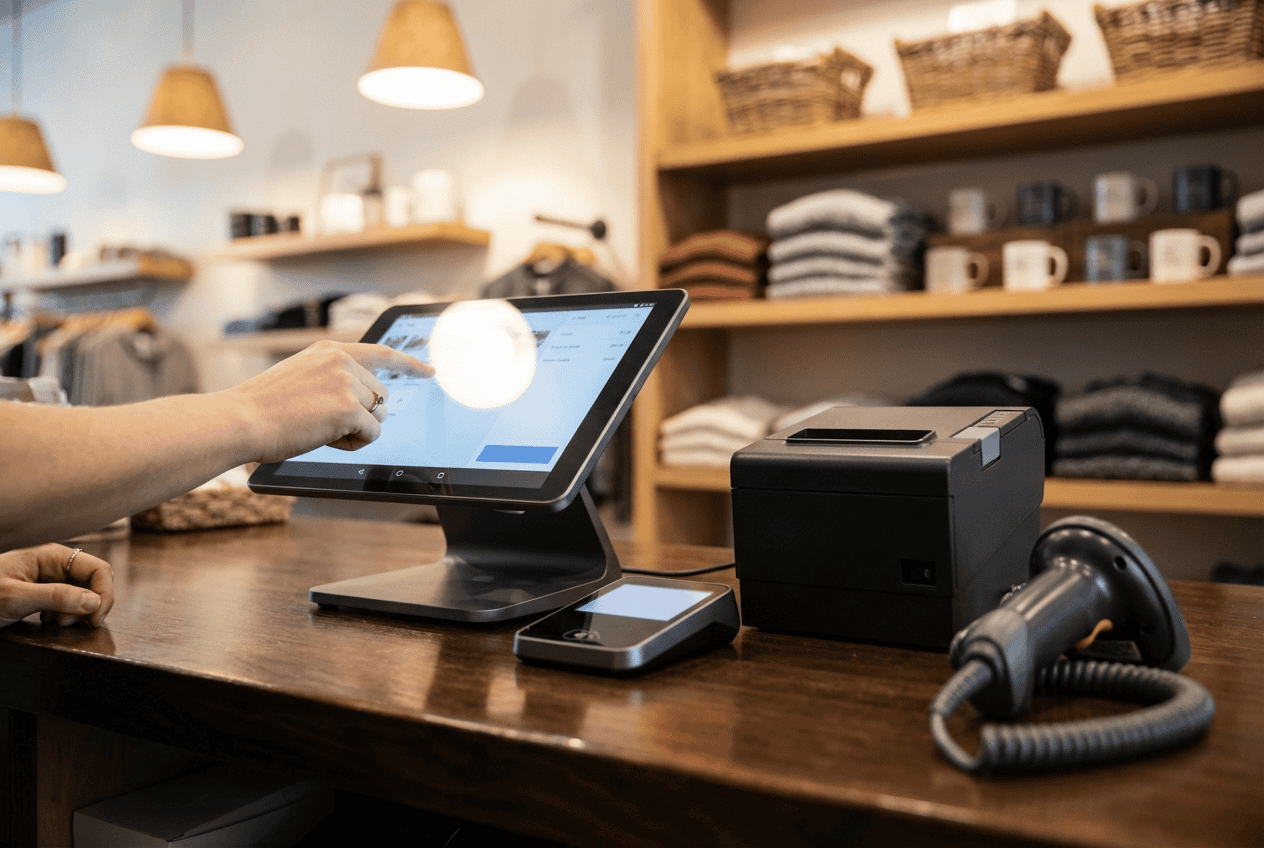Manufacturers today struggle with real-time data visibility across production, inventory, and sales, with 68% facing this issue, according to a 2023 Deloitte report. While POS systems are often linked to retail, they can revolutionize manufacturing by integrating with tools like ERPs, and supply chain analytics. A well-deployed POS enables real-time sales tracking, production syncing, and automated reordering.
This article explores why the point of sale for manufacturing is significant for businesses aiming to revolutionize their operations and drive sustainable growth.
Highlight
- Advanced POS systems built for manufacturers support real-time production tracking, raw material management, ERP integration, and flexible pricing controls.
- A POS designed for manufacturing drives industry evolution by streamlining operations, providing instant visibility, supporting growth, and enabling smarter, data-led decisions.
What is a Point of Sale for Manufacturing?
A point of sale for manufacturing is a system that integrates sales transactions with backend manufacturing and distribution operations. Unlike standard retail POS systems, a manufacturing POS is designed specifically to handle the unique complexities of a production environment, such as tracking materials, managing custom orders, coordinating with supply chains, and syncing with ERP systems.
Advanced POS Features Tailored for Manufacturers
Modern manufacturing businesses demand more than basic sales functionality. A specialized POS system for manufacturers is designed to integrate sales, inventory, and production into one cohesive platform.
- Multi-Channel and Multi-Location Management: Manufacturers often operate across multiple sales channels from wholesale to direct-to-consumer and multiple facilities, including warehouses and distribution centers. A manufacturing POS consolidates data across all locations and channels, ensuring synchronized inventory, order fulfillment, and reporting.
- Custom Product Configurations and Bill of Materials (BOM): Unlike standard retail, manufacturing involves products that may require customization or are built from multiple components. POS systems with BOM functionality enable users to create, modify, and track detailed product builds, guaranteeing production accuracy and material availability
- Employee Management and Workstation Tracking: Track employee roles, responsibilities, and productivity directly within the POS system. Assign work orders, monitor task completion, and manage labor costs all while improving accountability across your manufacturing floor.
- Barcode and RFID Integration: Boost operational efficiency with barcode scanning and RFID tagging. From raw material intake to final product shipping, these tools provide real-time tracking, cut manual errors, and systematize inventory and production processes.
- Mobile POS Solutions: Empower your team with on-the-go capabilities. Mobile POS systems allow managers and floor staff to access production data, check stock levels, and process orders from anywhere in the facility, increasing responsiveness and flexibility.
Why A Poinf of Sale for Manufacturing Businesses is The Key to Industry Revolution
Nowadays, manufacturers need more than just production efficiency; they need integrated, intelligent systems that connect every part of the business. That’s why point of sale for manufacturing is no longer a luxury but a necessity.
Accelerated and Streamlined Processes
One of the biggest reasons why point of sale for manufacturing matters is its ability to accelerate operations. A manufacturing POS connects departments in real-time, automating order entries, syncing production schedules, and minimizing delays caused by manual errors.
This optimized flow boosts productivity and allows teams to focus on value-adding activities rather than redundant administrative work.
Instant Inventory and Order Tracking
With built-in inventory management, a POS system provides real-time visibility into raw materials, finished goods, and order status. This confirms that stock levels are always accurate, helping manufacturers avoid costly overstocking or stockouts.
With tracking orders from placement to fulfillment, businesses can guarantee timely deliveries and quickly adapt to changes in demand.
Scalable for Future Expansion
As businesses grow, they need scalable systems that adapt to increasing demands. This is why point of sale for manufacturing is a fundamental investment for future-ready businesses.
►►► Optimal solution set for businesses: Multi store POS, Next-gen POS, Inventory Management Software (MSI), Self Service, Automation, Backorders

A cloud-based POS can flawlessly accommodate new locations, products, or sales channels without disrupting operations, making it ideal for manufacturers with growth ambitions.
Insightful, Data-Powered Strategies
Today’s manufacturing leaders rely on data to make informed decisions. A POS system collects detailed insights into sales trends, customer behaviors, and operational performance.
Understanding why point of sale for manufacturing leads to better strategies means recognizing its role in turning raw data into actionable intelligence that drives profitability and operational excellence.
Enhanced Customer Engagement
Customer experience is no longer just a retail concern. Even in manufacturing, especially in B2B models, strong client relationships matter.
The point of sale for manufacturing is significant; it allows businesses to offer personalized service, loyalty programs, and timely communication, all of which strengthen customer satisfaction and long-term loyalty.
Decreased Expenses, Increased Earnings
Automating sales, inventory, and financial reporting, a POS system decreases the need for manual labor and minimizes human error. It also identifies inefficiencies and waste within the supply chain.
With fewer delays, accurate pricing, and optimized processes, manufacturers can cut costs significantly while increasing revenue through better customer service and upselling opportunities.
Top 3 Best POS for Manufacturing Businesses
Manufacturers require a solution that integrates inventory, optimizes production workflows, manages suppliers, and offers comprehensive analytical insights. Thankfully, several POS providers have developed systems specifically designed to address these unique needs. Below, we will explore these POS options!
ConnectPOS – Best for Omnichannel and B2B Integration
ConnectPOS stands out as a top-tier solution tailored specifically for manufacturers. Designed to handle complex operations, it offers real-time synchronization across multiple warehouses and supports multi-location inventory tracking, and integrates strongly with major eCommerce platforms like Magento, Shopify, and BigCommerce.
Key features:
- Advanced Inventory Management: Real-time tracking across multiple warehouses, production lines, and distribution centers.
- Raw Material and Component Tracking: Monitor usage and availability of raw materials to optimize production planning.
- BOM (Bill of Materials) and Work Order Support: Facilitate manufacturing processes with structured product assembly workflows.
- Custom Pricing & Tax Rules: Tailored for B2B transactions with flexible pricing tiers and tax configurations.
- Supplier Management: Keep detailed records of supplier performance, deliveries, and purchasing history.
- Production and Sales Analytics: Actionable insights for production forecasting, sales trends, and inventory turnover.
- Multi-Device Compatibility: Operates smoothly on tablets, desktops, and mobile devices for on-the-go access.
- Seamless eCommerce Integration: Real-time sync with Magento, Shopify, and BigCommerce to align online orders with manufacturing output.
Whether you’re managing in-house production or outsourcing components, ConnectPOS provides manufacturers with the tools needed to optimize workflows, decrease waste, and elevate supply chain visibility. It’s an ideal fit for those seeking a scalable, flexible POS system designed to grow alongside a modern manufacturing business.
Square POS – Best for Small-Scale Manufacturers and Simplicity
Square POS is a popular choice among small to mid-sized manufacturers who value ease of use, affordability, and clean interface design. While it may not be built specifically for complex industrial environments, Square’s simplicity and integrations with third-party apps make it an excellent option for manufacturers selling directly to consumers.
Key features:
- Intuitive interface with minimal training required
- Basic inventory tracking with low stock alerts
- Affordable pricing with no monthly fees for basic plan
- Integration with accounting tools and online sales platforms
If your manufacturing business is just starting out or you need a low-cost, dependable solution, Square POS could be your go-to platform.
Shopify POS – Best for Manufacturers with D2C eCommerce Focus
Shopify POS is ideal for manufacturing businesses that combine direct-to-consumer sales with online storefronts. Its deep integration with Shopify’s eCommerce system makes it easy to manage inventory, process orders, and unify sales data from both online and offline channels.
Key features:
- Cohesive connection to Shopify eCommerce backend
- Real-time inventory updates across all channels
- Easy-to-use interface with customizable features
- Advanced reporting tools for sales and customer data
For manufacturers looking to strengthen their eCommerce presence while managing physical transactions, Shopify POS delivers a powerful and flexible platform.
FAQs: Why Point of Sale for Manufacturing
- How is a manufacturing POS system different from a retail POS?
A manufacturing POS system is tailored to handle complex inventory, production workflows, and supplier management, unlike a retail POS, which focuses primarily on sales transactions.
Manufacturing POS systems often integrate with ERP systems for seamless data flow across operations, offering deeper insights into production and supply chain processes.
- Can a POS system handle both B2B and B2C sales in manufacturing?
Yes, a POS system can manage both B2B and B2C sales by offering flexible pricing structures, customer segmentation, and order management features. It enables manufacturers to handle bulk orders, customized pricing, and invoices for B2B while supporting retail transactions for B2C, all within the same platform.
- Is it worth investing in a POS system for small-scale manufacturers?
Absolutely. Even small-scale manufacturers can benefit from a POS system by streamlining operations, tracking inventory in real time, and improving order accuracy. A POS system can also provide valuable insights into sales trends and customer behavior, helping small manufacturers make informed decisions and scale efficiently as they grow.
Conclusion
In summary, understanding why point of sale for manufacturing is important empowers businesses to break down data silos, optimize production workflows, and make smarter, data-driven decisions. A well-integrated POS system transforms operations by optimizing processes, providing real-time data visibility, and enabling smarter, data-driven decisions. It not only simplifies inventory management and order fulfillment but also empowers manufacturers to scale operations while enhancing customer engagement and cutting costs.
Among the top solutions available, ConnectPOS stands out as an industry leader, offering comprehensive features that support multi-channel and multi-location operations. If you’re ready to revolutionize your manufacturing operations, contact us today to learn how ConnectPOS can take your business to the next level with cutting-edge POS solutions.
►►► Optimal solution set for businesses: Shopify POS, Magento POS, BigCommerce POS, WooCommerce POS, NetSuite POS, E-Commerce POS




